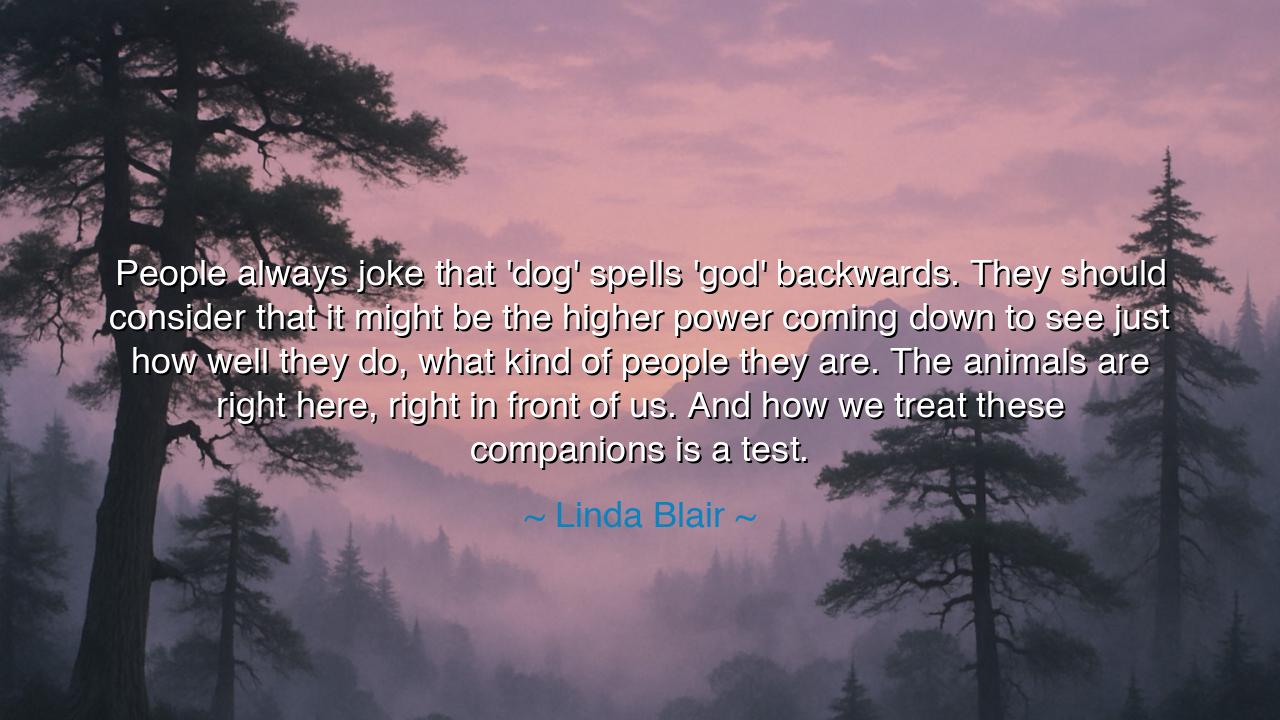
People always joke that 'dog' spells 'god' backwards. They
People always joke that 'dog' spells 'god' backwards. They should consider that it might be the higher power coming down to see just how well they do, what kind of people they are. The animals are right here, right in front of us. And how we treat these companions is a test.






Hear, O children of kindness and judgment, the words of Linda Blair, who spoke not of jest but of holy reflection: “People always joke that ‘dog’ spells ‘god’ backwards. They should consider that it might be the higher power coming down to see just how well they do, what kind of people they are. The animals are right here, right in front of us. And how we treat these companions is a test.” At first, it seems a simple play of letters, a lighthearted word-game. Yet in her saying, there is a sacred teaching—that perhaps the dog, humble and loyal, is more than a beast, but a mirror sent by heaven itself, to measure the state of our hearts.
The dog, throughout ages, has been humanity’s steadfast companion: guarding, hunting, guiding, loving without condition. Yet Blair reminds us that their presence is not only for our benefit, but also for our testing. How we treat those who cannot speak, who cannot demand justice, who depend upon us for mercy, reveals the truth of our souls more clearly than any prayer uttered with lips. For it is easy to honor the mighty, but the true measure of a person lies in how they treat the lowly, the voiceless, the defenseless.
History itself bears witness to this. In the annals of many kings, their cruelty toward the weak was a stain darker than any battlefield defeat. Consider the tale of Nero, whose heart was as twisted as his throne was gilded. He delighted in cruelty, not only to people but to beasts, treating all life as tools for his pleasure. His empire crumbled, his name cursed, for his treatment of the powerless revealed his unworthiness. Contrast him with Saint Francis of Assisi, who spoke of birds and wolves as brothers, who saw in every creature a reflection of the divine. His gentleness was not weakness, but holiness; and his memory, unlike Nero’s, shines with immortal light.
Blair’s words also recall the trials of ordinary people. In war and famine, there have been countless accounts of families who, though they themselves were starving, still shared bread with their dogs—not out of abundance, but out of compassion. In those moments, we see humanity’s truest essence. For when one chooses to care for a creature that offers no wealth, no power, only companionship, one proves that love still rules the heart. And is this not, as Blair says, the very test of higher power?
The deeper meaning of her saying is this: our treatment of animals reveals who we are when stripped of masks. To strike or neglect them is to show cruelty within, no matter how gentle one’s words may appear. To love and care for them is to show that compassion rules the heart. The dog as “god” reversed is not coincidence but parable—reminding us that our love for the least of these is seen, weighed, and remembered.
The lesson, then, is clear: never dismiss the creatures that walk beside us. See in them not burdens, but sacred trusts. When you show kindness to a dog, a cat, or any beast, you are in truth showing kindness to the Creator who shaped them. Treat their loyalty with reverence; treat their dependence with honor. In this way, your soul grows brighter, and your life is measured not by power but by compassion.
Practically, this means choosing daily acts of mercy: feed the hungry stray, protect the abandoned, cherish your companions not as possessions but as friends. Let your children learn gentleness through how you treat animals, for this will plant seeds of compassion that will grow into justice for all beings. Remember that the test Blair speaks of is ongoing, written not in grand gestures but in the small, daily choices of care.
So, O listeners, carry Linda Blair’s wisdom as a torch: the animals are here, right in front of us, and how we treat them is the test of our humanity. Do not fail this trial. For one day, when your own deeds are weighed, it may be found that the measure of your greatness was not how you ruled men, but how you treated the faithful dog at your side. In loving them, you have loved what is divine.
––






AAdministratorAdministrator
Welcome, honored guests. Please leave a comment, we will respond soon